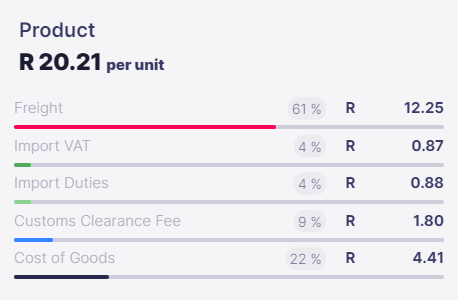
Shipping from China to South Africa is extremely cost-effective. However, the hidden fees of shipping and logistics can carry the true cost of cheap shipping.
Whether you’re a first-time importer or if you’ve been running a successful resale business for a while, the promise of cheap or even free shipping is a difficult one to resist. Who doesn’t want to slash business costs and support a healthy profit margin, after all?
Unfortunately, as experts in this industry, we must bear a warning message. In the world of shipping, “cheap” or “free” normally means “you’ll pay for this later”. We’ve written a guide to some common hidden costs of cheap shipping so you’ll never be caught out by unexpected fees.
First off, we thought we’d explain how China can offer such low production and shipping rates in the first place. So, we’re asking:
How is shipping from China so cheap?
The vast majority of Chinese suppliers can offer extremely competitive rates because the entire country is optimised for extremely high and extremely efficient volumes of production.
A combination of a skilled, efficient and cost-effective labour force and a large amount of infrastructure which makes mass production a possibility means that China has become a manufacturing powerhouse.
So, if your Chinese supplier is able to offer you really cheap shipping, that might be a genuine offer. However, another party in the shipping process could be kicking unforeseen costs further down the line until they land up (unexpectedly!) on your bill. To avoid any unpleasant surprises, we’ve explained some shipping costs which frequently make an unexpected appearance for merchants.
The most frequent and foreseeable costs which can crop up for merchants are fees associated with customs. If customs take an interest in your shipment, it can be held for a document check and/or a physical inspection.
Some shipping companies and warehouses will charge you storage or a demurrage fee for the use of their floor space while customs checks out your shipment.
So, how can you avoid demurrage fees? Well, prevention is better than cure in this case. Using a trustworthy logistics partner who uses their expertise to ensure that your shipment passes every possible customs requirement is a good start. Looking for other green flags – like a free warehouse storage period like the one offered by Airpool – will also help you avoid a nasty demurrage fee.
Some companies will charge an additional fee to help you calculate and pay for VAT and duty charges. These are known as deferment fees. Personally, we think that’s an unnecessary blow to small business owners. You can register with Airpool and estimate your duties and taxes free of charge.
What you might see as a standard delivery service is not necessarily what your shipping company will see as a standard delivery service. You might reasonably expect that a delivery service includes packing your boxes into a truck, driving them to your doorway, and unloading them into your office. After all, that’s what happens when you get a couch delivered from Takealot, right?
Unfortunately, things work a little differently in logistics. For some companies, a delivery service strictly means driving your shipment to your location, parking, and opening up the truck. A standard delivery fee may not cover the cost of deconsolidation (which is when your shipping company dissembles your shipment once it’s landed in South Africa) or the cost of unloading the boxes from the truck into your office.
Arguably one of the most unpleasant hidden costs of shipping is a handover fee. Handover fees can throttle a business’s growth or, if it’s a new venture, kill it before it’s even taken off.
Once your goods have been shipped to South Africa, they’ll go to a deconsolidation centre where (like the name suggests) they’ll be deconsolidated and prepared to be packed up and couriered to your location.
However, some companies will charge a handover fee before they release your goods from their deconsolidation centre. This handover fee can be extortionately high. We recently dealt with a client who was stung with a handover fee that was triple the total cost of freight. Nobody wants to see something like that on their bill.
Shipping is risky, and some costs (especially those associated with customs) are unavoidable. However, there are some costs – like handover fees – which should be disclosed upfront. Nobody wants to be zapped with nasty and unexpected fees later down the line. So, what can you do to ensure that never happens to you?
As we said before, prevention is better than cure in these cases. The first thing that you could do is demand transparency from your supplier and your shipment company. Double check with them and confirm that you won’t be charged for anything that you haven’t already been quoted for.
Otherwise, you could just ask Airpool. We offer our insight and expertise to all small business owners, even if you aren’t using our shipping services right now. We’re all for helping you grow your business, not watching you bleed out from the thorns in your side. If you ping us on our helpline, we’ll respond in 5-15 minutes during working hours.
Developing a personal relationship with a trustworthy and knowledgable logistics partner can help you avoid being stuck with surprise costs or, when unexpected costs are unavoidable, ensure that your business stays afloat. Put us to the test! Contact us today and you’ll gain more than just a logistics service – you’ll gain a logistics partner.
Landed cost is the sum of all expenses associated with importing your goods from China to South Africa. This includes the cost of the goods paid to your supplier, the shipping costs, clearance costs and the import taxes & duties.
It is represented on a per unit cost and helps you with:
Note: This is not what you are paying to Airpool but rather what you are paying to all the suppliers and relevant parties: Airpool, the Manufacturer of the goods and the Import Taxes (VAT & Duties)
